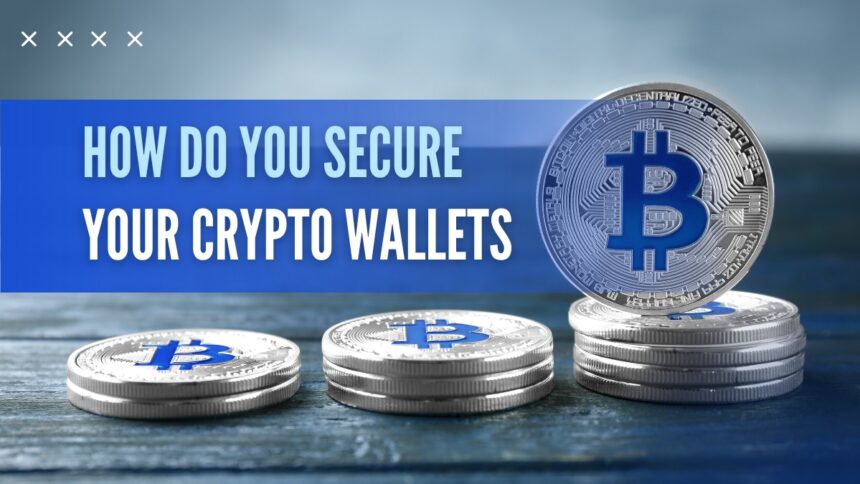secure your crypto wallets
India has emerged as a vibrant hub for cryptocurrency, with millions of individuals embracing the world of digital assets.
While the potential for wealth creation is undeniable, safeguarding your crypto holdings is paramount.
In this digital landscape, your crypto wallet becomes your virtual vault, demanding robust security measures to shield your investments from prying eyes and malicious actors.
But where do you begin? This comprehensive guide delves into the essential steps to fortify your crypto wallets in India, ensuring your digital riches remain secure:
How do you secure your crypto wallets in India?

Hardware Wallets:
Deemed the Fort Knox of crypto storage, hardware wallets are physical devices resembling USB drives that store your private keys offline, making them impervious to online attacks. Popular options include Ledger and Trezor, offering robust security features and user-friendly interfaces.
Software Wallets:
These downloadable apps, like Exodus or Coinomi, provide convenient access to your crypto holdings on your phone or computer. While convenient, they remain susceptible to malware and hacking, making them suitable for smaller amounts or frequent trading.
Exchange Wallets:
Many cryptocurrency exchanges, like WazirX and Zebpay, offer built-in wallets for storing your holdings. However, these are custodial wallets, meaning the exchange holds your private keys, raising concerns about centralized control and potential security breaches.
Securing Your Private Keys: The Golden Key to Your Crypto Kingdom
Your private key is the master password to your crypto holdings. Treat it with the utmost secrecy and safeguard it with meticulous care:
- Never share your private key with anyone, including exchange support. Legitimate platforms will never ask for your private key.
- Please write down your private key on a physical piece of paper and store it in a secure location, preferably a fireproof safe or bank deposit box. Avoid digital backups, as even encrypted versions can be compromised.
- Consider mnemonic seed phrases, a series of words to recover your private key. Memorize them or store them securely, just like your private key.
Password Power: Building a Wall of Defense
- Create strong, unique passwords for each wallet and exchange account. Avoid using personal information, dictionary words, or predictable sequences.
- Employ a password manager to generate and store your passwords securely. Tools like LastPass and KeePassXC offer robust encryption and convenient access.
- Enable two-factor authentication (2FA) on all your wallets and exchange accounts. This adds an extra layer of security by requiring a second verification code, typically sent via SMS or authenticator app, before authorizing transactions.
Safety First: Navigating the Digital Landscape
- Download and update your wallet software only from official sources. Avoid third-party app stores or suspicious links.
- Beware of phishing scams. Malicious actors often impersonate legitimate platforms to steal your login credentials. Always double-check website URLs and sender addresses before entering any information.
- Never connect your wallet to public Wi-Fi or shared computers. These networks are prime targets for hackers. Use a secure VPN or use your trusted home network for crypto transactions.
- Stay informed about common crypto scams and security vulnerabilities. Regularly read news articles and security advisories from reputable sources to stay ahead of the curve.
Additional Layers of Protection for the Cautious Crypto Enthusiast
- Consider multi-signature wallets, requiring multiple authorized individuals to sign transactions, adding an extra layer of security for extensive holdings.
- For additional protection, encrypt your sensitive data, including private keys and seed phrases.
- Regularly back up your wallet data and store it securely, separate from your primary devices.
Remember:
Your crypto security is your responsibility. By implementing these best practices and remaining vigilant, you can build a robust digital fortress around your crypto holdings, ensuring your hard-earned assets remain protected in the ever-evolving world of blockchain technology.
secure your crypto wallets secure your crypto wallets secure your crypto wallets secure your crypto wallets secure your crypto wallets secure your crypto wallets
